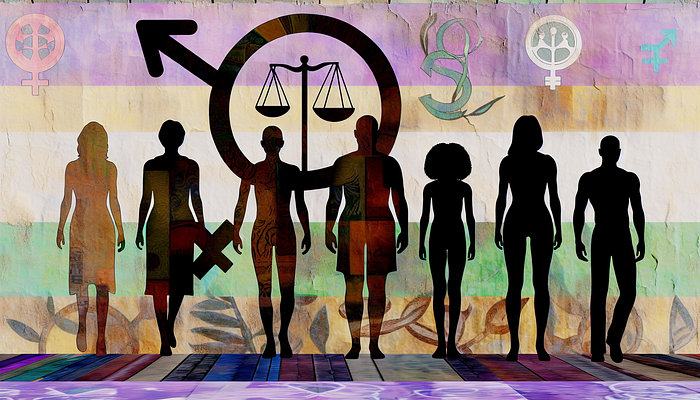Inconvenient Truths: Examining the Claims and Implications of 'The ABC of My Trans Adventure, Part Four'
Debunking Conspiracies and Confronting Misinformation

D is for Daring to Defy Deception, Disinformation, and Discrimination
Here is a link to part one, two, three, and four.
In the fourth and final installment (thank goodness) of the "ABC of My Trans Adventure" series, the author, known only as Helene, delves into a web of conspiracy theories, unsupported claims, and personal anecdotes to argue against the validity of transgender identities and the importance of gender-affirming care. As we are dedicated to promoting truth, understanding, and the well-being of all individuals, including transgender people and their families, we feel compelled to address the numerous inaccuracies and harmful implications presented in this article. In this article, we will examine the claims made and the story told, and provide for a more balanced, evidence-based perspective on Helen’s wonderful web of an essay that reads more like fiction than fact.
So let’s get started:
Conspiracy Theories and Unsupported Claims:
The author begins by discussing the "Jaffe Memo," a document from the 1970s that allegedly outlines a plan to limit U.S. population growth. They claim that the rise of "gender confusion ideology" is a recent addition to this plan, designed to "prevent mass births." However, the author provides no credible evidence to support this claim, relying instead on conspiracy theories and speculation.
It is crucial to recognize that the existence of transgender individuals and the need for gender-affirming care are not the result of a nefarious plot to control population growth. Gender diversity has been documented throughout history and across cultures1, and the increased visibility and acceptance of transgender people in recent years are the result of ongoing advocacy, research, and societal progress in understanding and respecting gender identity2.
Moreover, the author's claim that the "trans deception" was "socially engineered years ago" is not supported by any credible evidence. The suggestion that the experiences of transgender individuals and the challenges they face are part of a predetermined plan is not only unfounded but also dismissive of the real struggles, identities, and experiences of transgender people.
Personal Anecdotes and Generalization:
The author shares their personal story of detransitioning and the challenges they faced during and after their transition. While their experiences are valid and deserve to be heard, it is important to recognize that individual stories cannot be used to make broad generalizations about the transgender community as a whole.
Research has consistently shown that access to gender-affirming care, including hormone therapy and surgery, can significantly improve the mental health and overall well-being of transgender individuals3. While detransition does occur, it is rare, and the reasons for detransitioning are often complex and multifaceted, including societal pressure, discrimination, and lack of support4.
It is crucial to approach the topic of detransition with empathy and understanding, while also acknowledging that the experiences of a small minority do not negate the validity and importance of gender-affirming care for the vast majority of transgender individuals who benefit from it. We do not throw out the baby with the bathwater.
Dismissal of Inclusive Language and Pronouns:
The author expresses their refusal to use inclusive language and pronouns, claiming that they will not "comply with established nonsense." However, this stance fails to recognize the importance of language in creating a more inclusive and respectful society for all individuals, regardless of their gender identity.
Using a person's preferred pronouns and respecting their gender identity is a matter of basic human dignity, courtesy, and respect5. It is not about "playing along" with "unreasonable demands" but rather about acknowledging and validating the lived experiences of transgender individuals and creating a more welcoming environment for them. Or anyone, really. We do this all the time for married and divorced people, as well as artists as a matter of course and routine.
Moreover, the author's dismissal of non-binary identities and the use of gender-neutral language is not only disrespectful but also fails to acknowledge the growing body of research that supports the existence and validity of non-binary gender identities6.
Moving Forward and Affirming Transgender Identities:
The author concludes by expressing their hope for a future "free from pervert, greedy and power hungry 'experts'" and the "slavery of mental confusion and bodily harm." These statements are not only inflammatory and offensive but also perpetuate harmful stereotypes about transgender individuals and the professionals who support them. Furthermore, it casts doubt upon the validity of the entire essay, and if this is there motivation behind each installment, then the entire series as well.
It is essential to recognize that the medical and mental health professionals who provide gender-affirming care are guided by evidence-based practices and a commitment to the well-being of their patients7. Accusing them of being "perverts" or "power hungry" is not only baseless but also undermines the important work they do in supporting transgender individuals and their families.
As a society, we must strive to create a world where all individuals, including transgender people, can live authentically and without fear of discrimination or harassment. This involves promoting understanding, empathy, and respect for diverse gender identities, as well as ensuring access to appropriate healthcare and support services. This does not just benefit trans people, but all people.
H is for Honor, Honesty, Heartfelt and Healing, not Hurtful Hyperbole, Horrible Half-truths, and Hasty Generalizations
To the author of this series, we write and operate under the assumption of the validity of your experiences. We believe that this is what you believe. As such, we extend our heartfelt empathy and sympathy for the challenges you have faced and the pain you have endured. Your experiences are valid, and your voice deserves to be heard. However, we also urge you to consider the impact of your words on the transgender community as a whole and to recognize that your personal journey does not negate the validity of others' identities and experiences.
Throughout the article, you seem to attribute your decisions and challenges to external factors, such as the alleged conspiracy, rather than engaging in deep introspection and taking responsibility for your own choices and actions. This lack of self-reflection limits the depth and authenticity of your narrative.
Furthermore, by framing your personal journey as a result of a larger conspiracy and using it to argue against the validity of transgender identities and the importance of gender-affirming care, you dismiss the experiences and needs of countless other transgender individuals who have benefited from such care and support.
Additionally, the manner in which you present your story and the conclusions you draw from it raise significant concerns about the overall validity and reliability of your story. The heavy reliance on conspiracy theories, generalization, lack of introspection, inflammatory language, and dismissal of others' experiences undermine your credibility, and by extension, the validity of this article, and in light of the extensive fact-checking we have done, the entire series as a whole.
We encourage you to refrain from attributing blame or responsibility to a conspiratorial agenda and portraying yourself as a powerless casualty swept up in a 'multi-pronged agenda.' Instead, please know from our own experiences that there is healing and empowerment in taking ownership of your choices, actions, and outcomes. While external factors may have influenced your decision to transition, it is crucial to acknowledge that ultimately, the choice was yours.
Although your transition journey did not lead to the outcome you desired, it is important to recognize that this does not justify spreading fear, uncertainty, and doubt or fomenting anger, hate, and discontent based on your personal experiences. Every individual's path is unique, and what may not have been right for you could still be life-saving and affirming for countless others.
To the parents, families, and allies of transgender individuals who may have come across this series, we encourage you to seek out credible sources of information and support as you navigate this complex and often challenging journey. Remember that your love, acceptance, and support can make a world of difference in the lives of your transgender loved ones.
Do not fall for the conspiracy theories, unsupported claims, and harmful generalizations used to argue against the validity of transgender identities and the importance of gender-affirming care.
By engaging in respectful dialogue, citing credible evidence, and promoting empathy and understanding, we hope to foster a more informed and compassionate society where all individuals, regardless of their gender identity, can live being true to themselves, openly, with dignity and respect we all deserve.
Stryker, S. (2017). Transgender history: The roots of today's revolution. Seal Press. ↩
Bockting, W. O. (2008). Psychotherapy and the real-life experience: From gender dichotomy to gender diversity. Sexologies, 17(4), 211-224. ↩
Dhejne, C., Van Vlerken, R., Heylens, G., & Arcelus, J. (2016). Mental health and gender dysphoria: A review of the literature. International Review of Psychiatry, 28(1), 44-57. ↩
Turban, J. L., Loo, S. S., Almazan, A. N., & Keuroghlian, A. S. (2021). Factors leading to "detransition" among transgender and gender diverse people in the United States: A mixed-methods analysis. LGBT Health, 8(4), 273-280. ↩
Russell, S. T., Pollitt, A. M., Li, G., & Grossman, A. H. (2018). Chosen name use is linked to reduced depressive symptoms, suicidal ideation, and suicidal behavior among transgender youth. Journal of Adolescent Health, 63(4), 503-505. ↩
Richards, C., Bouman, W. P., Seal, L., Barker, M. J., Nieder, T. O., & T'Sjoen, G. (2016). Non-binary or genderqueer genders. International Review of Psychiatry, 28(1), 95-102. ↩
Coleman, E., Bockting, W., Botzer, M., Cohen-Kettenis, P., DeCuypere, G., Feldman, J., ... & Zucker, K. (2012). Standards of care for the health of transsexual, transgender, and gender-nonconforming people, version 7. International Journal of Transgenderism, 13(4), 165-232. ↩


